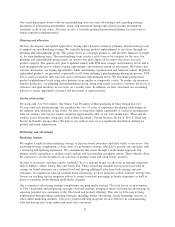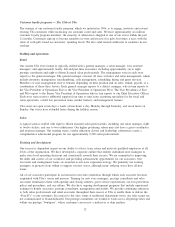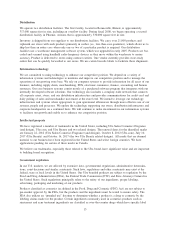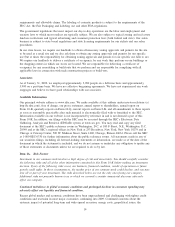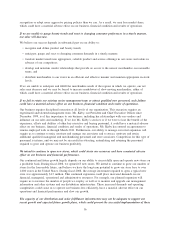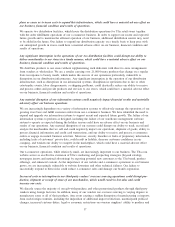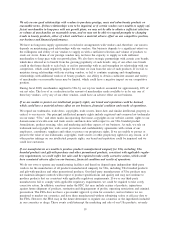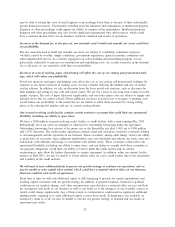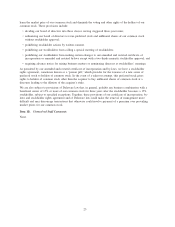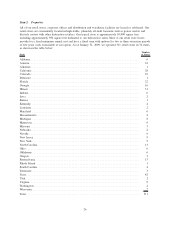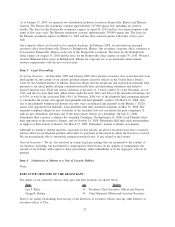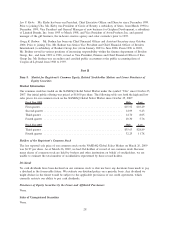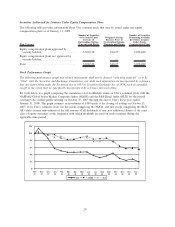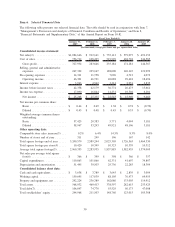Ulta 2008 Annual Report Download - page 26
Download and view the complete annual report
Please find page 26 of the 2008 Ulta annual report below. You can navigate through the pages in the report by either clicking on the pages listed below, or by using the keyword search tool below to find specific information within the annual report.damage our brand reputation and image in the marketplace, increase the cost of our products, cause us to fail
to meet customer expectations or cause us to be unable to deliver merchandise in sufficient quantities or of
sufficient quality to our stores, any of which could result in lost sales, which could have a material adverse
effect on our business, financial condition and results of operations.
We, as well as our vendors, are subject to laws and regulations that could require us to modify our current
business practices and incur increased costs, which could have a material adverse effect on our business,
financial condition and results of operations.
In our U.S. markets, numerous laws and regulations at the federal, state and local levels can affect our
business. Legal requirements are frequently changed and subject to interpretation, and we are unable to predict
the ultimate cost of compliance with these requirements or their effect on our operations. If we fail to comply
with any present or future laws or regulations, we could be subject to future liabilities, a prohibition on the
operation of our stores or a prohibition on the sale of our Ulta branded products. In particular, failure to
adequately comply with the following legal requirements could have a material adverse effect on our business,
financial conditions and results of operations:
• Our rapidly expanding workforce, growing in pace with our number of stores, makes us vulnerable to
changes in labor and employment laws. In addition, changes in federal and state minimum wage laws and
other laws relating to employee benefits could cause us to incur additional wage and benefits costs, which
could hurt our profitability and affect our growth strategy.
• Our salon business is subject to state board regulations and state licensing requirements for our stylists
and our salon procedures. Failure to maintain compliance with these regulatory and licensing requirements
could jeopardize the viability of our salons.
• We operate stores in California, which has enacted legislation commonly referred to as “Proposition 65”
requiring that “clear and reasonable” warnings be given to consumers who are exposed to chemicals
known to the State of California to cause cancer or reproductive toxicity. Although we have sought to
comply with Proposition 65 requirements, there can be no assurance that we will not be adversely affected
by litigation relating to Proposition 65.
In addition, the formulation, manufacturing, packaging, labeling, distribution, sale and storage of our vendors’
products and our Ulta products are subject to extensive regulation by various federal agencies, including the
FDA, the FTC and state attorneys general in the United States. If we, our vendors or the manufacturers of our
Ulta products fail to comply with those regulations, we could become subject to significant penalties or claims,
which could harm our results of operations or our ability to conduct our business. In addition, the adoption of
new regulations or changes in the interpretations of existing regulations may result in significant compliance
costs or discontinuation of product sales and may impair the marketability of our vendors’ products or our
Ulta products, resulting in significant loss of net sales. Our failure to comply with FTC or state regulations
that cover our vendors’ products or our Ulta product claims and advertising, including direct claims and
advertising by us, may result in enforcement actions and imposition of penalties or otherwise harm the
distribution and sale of our products.
As we grow the number of our stores in new cities and states, we are subject to local building codes in an
increasing number of local jurisdictions. Our failure to comply with local building codes, and the failure of
our landlords to obtain certificates of occupancy in a timely manner, could cause delays in our new store
openings, which could increase our store opening costs, cause us to incur lost sales and profits, and damage
our public reputation.
Ensuring compliance with local zoning and real estate land use restrictions across numerous jurisdictions is
increasingly challenging as we grow the number of our stores in new cities and states. Our store leases
generally require us to provide a certificate of occupancy with respect to the interior build-out of our stores
(landlords generally provide the certificate of occupancy with respect to the shell of the store and the larger
shopping area and common areas), and while we strive to remain in compliance with local building codes
relating to the interior buildout of our stores, the constantly increasing number of local jurisdictions in which
20



